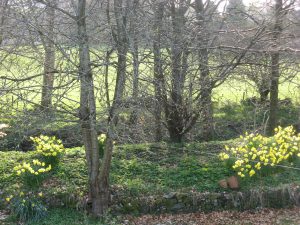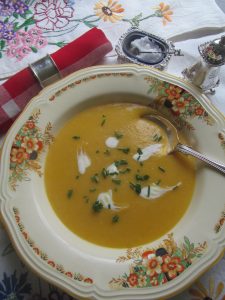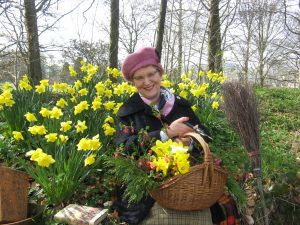




The landscape with its watery grey skies, brown hills and black skeletal trees looks like a painter’s sketch before the colour and definition are added. Late evening skies have become flame coloured stripes as the day begins to stretch and the dark recedes. The only contrast has been that provided by the snowdrops and now replaced by daffodils knocked horizontal by the wind and sleet. The yellow is at first arresting and almost shocking after the grey of what seems like forever.
Here and there down by the river’s edge a flash of further colour is provided by the orange beaks of the oyster catchers. Along the river’s embankments are spots of blue and white, the fragments of farmhouse china washed down by the spate from the places, higher up the glens where broken dinner plates, ashets* and prized serving dishes have been dislodged from where they were dumped by isolated and annoyed wives. It is the archaeology of the ordinary and reveals the taste of 18th and 19th century rural families. There is an obvious fondness for willow type patterns with their story of love and death. Jasper Wylie likes to wander along the river bank collecting these examples and wondering what the whole object looked like and what was happening when they were broken, was it slip of the hand, too hasty housework, an unexpected knock on Belfast sink or a skilful aim?
The Scottish countryside, especially in the under explored and great expanses of the south west can be inexplicably beautiful at this time of year. There is something about the trees silhouetted against sky and earth and indeed walks are such a sense of achievement. Just the same, the endlessly dark days take their toll. The human spirit needs light and there has been little of that. Over the past few months it is not unknown for heavy winter curtains to be closed shortly after 2.30 pm and fire lit just to provide some cheer. Since New Year neighbours have seen little of one another as each household has occupied itself with the need to keep warm. The focus of life becomes fire wood and of course soup.
The nature and extent of one’s wood store is a matter of pride and not inconsiderable boasting. Unlike coal bunkers, timber store are not hidden away but are on full view, a visual reminder of the owner’s knowledge of wind direction and matters arboreal. This is the world of men in winter, they look after the exterior of their family’s body and an axe is their symbol of office.

For the women of the countryside is it the interior which is their concern. You will not go far on a winter’s morn before you meet some bustling figure out to purchase some essential. There will be a cursory greeting, a comment about the weather, a snatch of the latest gossip about who is suspected of doing what with who, but she “canny stop, ah have jis’ put a pot o’ soup on, you’ll need to come by and I’ll catch you up wi’ a wee cup o’ tea.” In other words the juicy details will have to wait and then they will be analysed in forensic detail over a nice piece of buttered ginger bread. Her symbols of office are the heavy iron soup pot and the wooden spoon.

Those lucky enough to have a house in the city in which to pass the winter months return as the danger of ice on the roads recedes and their classes in pottery or conversational French draw to a close. The Wylies open up their Rural Bolthole and enjoy the little bit of warmth that is beginning to appear.
Back to Normal

Muriel Wylie is sitting in her pew in the Church in the village where she and her husband Jasper have their rural bolthole. They have come down to open up the house after winter. The Church has a visiting minister as the most recent incumbent has found himself “resting” in an institution in Lochgilphead. He found the whole foreign soup saga too much to bear and finally succumbed to nervous collapse with Muriel’s introduction of Mulligatawny. This raised a storm in the face of traditional recipes handed down by word of mouth since John Knox raged against Mary, Queen of Scots who also introduced some foreign soups into her court not to mention an Italian musician who liked to play footsie with her husband under the backgammon table.
Muriel has an exclusive pew in the centre of the Kirk and is sitting next to Mrs Cynthia Savage, wife of the pickle magnate who is as ever slightly smelling of chutney. Jasper is of course on her left and in front are Mr and Mrs Macaulay. He has made his money in the building of bungalows and a secret concrete recipe. Muriel is glad he is in front as he has W.H.T. (wandering hands trouble to the initiated) which can be an issue during the offering.
It is no secret that the Macaulays are estranged since Lottie rebelled against her philandering husband who kept her in her place with unlimited access to ill chosen two piece suits and vulgar overstuffed three piece suites. Somehow Lottie has managed to gain the upper hand and has a controlling interest in the concrete part of his business. It seems she knows the correct relationship of cement to sand and discovered that Mr Macaulay has been short changing his clients. The other wives who know Lottie well are pleased she has stood up to him. However, there are always those who tut at the disintegrating marriage: “Our sort just don’t do that sort of thing, do we? One just grins and bares it.” They are just jealous.
Husbands meanwhile are nervous, fearful that Pandora’s box has been opened and that the day may dawn when they all may, figuratively speaking, find themselves in a concrete overcoat. The ability to tut, is by the way, a major advantage in rural society. When the wind blows and one can hardly speak for fear of losing one’s upper set of wallies one can always tut.
The disapproving tut is considered the most desirable of rustic qualities, it takes many years of practice and when combined with the ferocious scowl and folded arms is a very effective piece of communication. It is the all encompassing apron wearers equivalent of the Damnation of Faust or the casting out into the wilderness. If the wind drops, one only has to add “by the way” and the message is sent home like an arrow to its target.
Talking of the wilderness, Muriel is finding it hard to concentrate on the Minister’s sermon which is about Lent. She is day dreaming and gazing at a rather beautiful window featuring St Andrew as “A Fisher of Men”. The sun is shining through the window casting a saintly blue hue over the congregation with the noticeable exception of Mr Macaulay. Muriel notices that the window is a gift, marking the contribution of a minister in earlier times. She wonders if one day there might be a window to Muriel Wylie in memory of a simply marvellous life and an incalculable contribution to gracious living. “After all I am” she thinks “the retail equivalent of a fisher of men; I attract people to my shop and reel them in for soft furnishings which will be uplifting inn their humdrum lives.”
The Minister sees her attention has wandered and, despite being aware of her reputation, is emboldened by his elevated position in the pulpit which is so high low cloud would block him out all together. He glares at her directly. “As I was saying Lent is a preparation…..Lent is a reflection of the food shortages after winter and the shortage of pickled onions in your jars, to put in layman’s terms.”
He looks somewhat disapproving when he asks what everyone has given up for Lent. There is of course no response, so he asks again and looks pointedly at Muriel, “Come Mrs Wylie you are not one to shy from public proclamation. Is there anything you have given up for Lent?” Muriel creates a hiatus by powdering her nose, looking in her mirror, (at which point there is an audible intake of breath from the congregation – John Knox was not one for mirrors),takes her distance glasses from her handbag, snaps the catch shut which reverberates around the building, puts them on and glares at the figure in the pulpit.
“Tonic water in my gin and tonic.” The somewhat nonplussed Minister suggests that one cannot drink gin without tonic (although Mrs Macaulay is known to have been doing it for years). “One can if one replaces it with Dubonnet”, retorted Muriel, removing her distance glasses with studied theatricality. “Mrs Wylie, that is hardly in the spirit of Lent.” To which Mrs Macaulay, with her new lease of life is heard to mutter “No, it is two spirits in the spirit of Lent.” This sends Cynthia Savage into a fit of the giggles. Muriel annoyed that her reverie regarding her future memorialisation has been interrupted replies, “Well if you don’t want an honest answer, don’t ask the question.”
From upstairs in the padded lairds’ pews, the Duchess of Dunstaffnage who has been spending the weekend with Lady Pentland-Firth, asked Patience to repeat what had been said in her good ear. As neither of her ears were good she had to shout, “She said she is drinking gin and dubonnet for Lent.” The Duchess rose to her feet and took her lorgnette to get a closer view of the woman who had failed to keep quiet in the church.
There was an audible gasp and the Duchess (who has been a lifelong member of the Temperance Movement since her father drowned in a distillery in Islay) collapsed in a faint. Fortunately, it turned out that Mrs Travers, the Wylies’ daily woman what does, but not a lot, was sitting at the back of the balcony, behind the duchess and Lady P-F, in the cheap seats traditionally reserved for servants who could hear but not see the proceedings.

Mrs Travers had also found her attention wandering and had already knitted the right arm of a jumper for her Billy during “Onward Christian Soldiers” and had been rummaging around behind the pews where she found the Christmas manger made out of a tomato box and the missing baby Jesus believed to have been stolen by members of a rival parish two years ago during a “Best Nativity Scene competition. In addition she had also found a bottle of Communion wine which she had opened and poured into the tea she had in a thermos flask.
With the commotion in front of her, she rushed forward with her flask and tipped the liquor into the open mouth of the Duchess who was soon revived. As the Duchess came to her senses, not that she had many, she hiccupped and having drained the rest of the cup from the thermos flask demanded more and shouted “that woman should be hanged.”
The minister announces the final hymn “Will your anchor hold through the storms of life.”